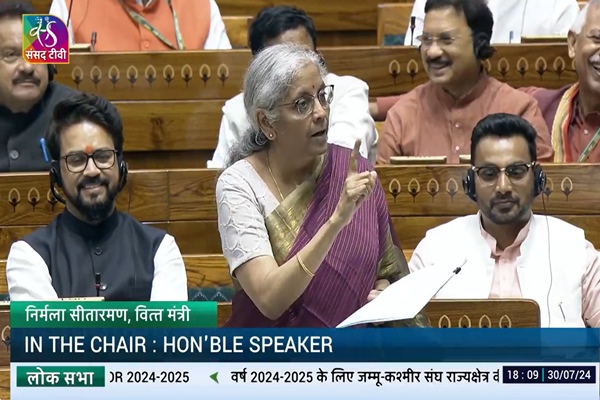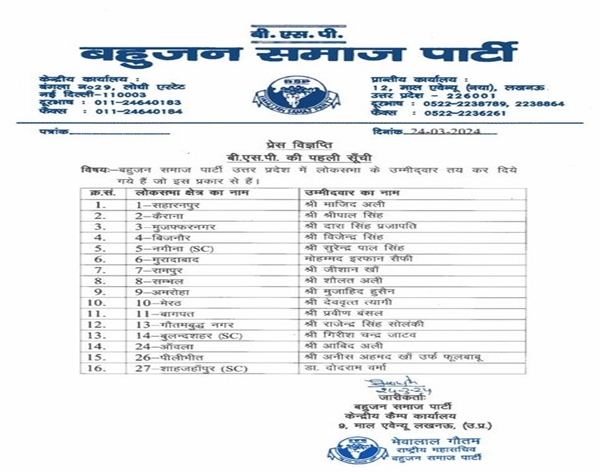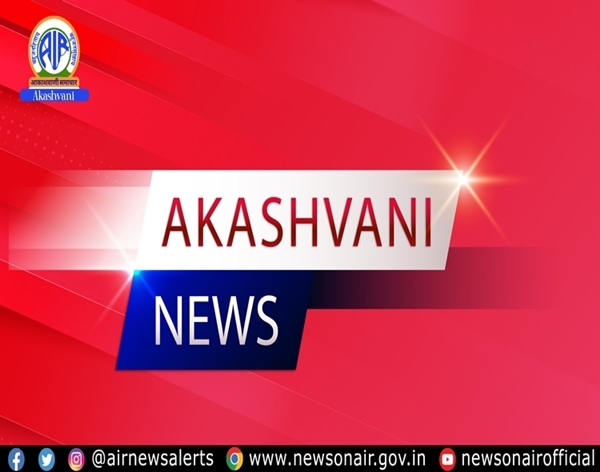Finance Minister Nirmala Sitharaman today emphasised that Government is complying with fiscal deficit trajectory and will bring it down to below 4.5 per cent by 2025-26. Replying to the discussion on the Union Budget 2024-25 and the Budget for Union Territory of Jammu and Kashmir for 2024-25 in the Lok Sabha, Ms Sitharaman said India is the fastest growing economy post-Covid. She said everyone should work together to build a Viksit Bharat by 2047. She pointed out that Indian economy is shining like a bright spot even after the Covid pandemic.
The Finance Minister thanked the citizens, the middle class, entrepreneurs, farmers, marginal workers and traders for their contribution towards India becoming the fastest growing economy over the last three years. She said this could not have been possible without the visionary leadership of Prime Minister Narendra Modi.
She stressed that expenditure of the government has grown exponentially and is 48.21 lakh crore rupees for 2023-24 fiscal. The Finance Minister said expenditure is projected to grow by about 7.3 percent over 2023-24. The Finance Minister highlighted that Budget allocation on sectors such as agriculture and allied sector, rural development, urban development, health and social welfare have increased. She asserted that nowhere has the Budget given lesser allocation than the previous year.
She said the Union Budget tries to bring in balance amongst several objectives, so that inequality can be addressed through better and higher growth. She said government tried balancing factors such as growth, employment, welfare spending, capital investments and fiscal consolidation in the Budget.
Ms Sitharaman emphasised that the revenue deficit to fiscal deficit ratio is expected to fall to 36 percent in 2024-25 from 80 percent in 2020-2021, reflecting that the fact that expenditure is going towards quality assets creation.
Finance Minister pointed out that the Budget allocation for the department of agriculture and farmers’ welfare was only 21 thousand 934 crore rupees in 2013-2014. She emphasised that this has increased to 1.23 lakh crore rupees, which is an increase of five times. She added that more than 3.2 lakh crore rupees have been disbursed to over 11 crore farmers under PM Kisan since its launch.
On the issue of unemployment, Ms Sitharaman claimed that NDA government created 12.5 crore jobs in the last ten years in comparison to 2.3 crore jobs created by the UPA government in ten years. She added that employment opportunities have increased in the last decade and it has increased from 34 percent in 2014 to 51 percent in 2025. The Finance Minister credited skilling and skill development initiatives undertaken by the government for this. She highlighted that this time, a package of five schemes for skill development has been provided in the Union Budget.
The Finance Minister said India’s inflation between 2020 and 2023 is much lower than global average. She underlined that inspite of COVID, Narendra Modi government planned the economy in such a way that inflation did not affect the economy that badly.
Ms Sitharaman stated that concrete steps have been taken for Jammu and Kashmir to break free from the legacy of fiscal distress. She said Centre has provided substantial financial support of 17 thousand crores in the Union Budget of the UT of Jammu and Kashmir this year. She said it includes 12 thousand crore rupees towards financing the cost of Jammu and Kashmir Police, so that the UT has more money to spend towards developmental activities. She said unemployment rate of the age group 15 to 59 years has actually come down in Jammu and Kashmir from 6.4 percent in 2020-21 to 5.7 percent in 2021-2-22 to 4.4 percent in 2022-23. She also highlighted that several initiatives have been taken for tribal welfare in Jammu and Kashmir.
Ms Sitharaman stated that not mentioning any state in the Budget speech does not mean that money has not been given to these states.
The Finance Minister said the General Budget 2024-25 seeks to consolidate all earlier accomplishments and it outlines measures to overcome the challenges. She added that government is taking a whole of nation approach and seeking to fulfil the aspirations of the people.
Later, the House passed the Jammu and Kashmir Appropriation (No.3) Bill, 2024. The Bill authorises payment and appropriation of certain sums from and out of the Consolidated Fund of the Union Territory of Jammu and Kashmir for the services of the financial year 2024-25. Lok Sabha also approved Demands for Grants of the Union Territory of Jammu and Kashmir for 2024-25.
Earlier, participating in the discussion, Devendra Singh of BJP said, this budget will take the country towards inclusive growth. He said the government is committed to the welfare of farmers and major allocations were made in the Union Budget for the agriculture sector. He said the Budget will be instrumental in promoting natural farming across the country. He said the government has taken several steps to create employment opportunities in the country. Akhilesh Yadav of Samajwadi Party said, this year’s budget is silent about unemployment and development of rural areas. He said, no big announcement was made for any projects in Uttar Pradesh. Mr. Yadav said, the trade deficit is continuously increasing and no concrete steps have been taken to control it. He added that exports are also witnessing a declining trend.
Amraram of CPI (M) alleged that the Union Budget has no concrete provisions to address the concerns of farmers, soldiers, women and poors. Rajesh Verma of LJP (Ram Vilas) said, through this budget efforts have been made to empower youth, women, poor and farmers. He said, the budget focuses on employment generation and skill training. Saptagiri Sankar Ulaka of Congress alleged that it has a weak budget. He said, his party has no problem whether special assistance is given to Bihar and Andhra Pradesh but Odisha should also be taken care of.















